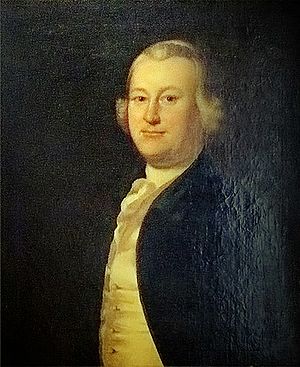James Otis Jr. facts for kids
Quick facts for kids
James Otis
|
|
|---|---|

Portrait by Joseph Blackburn, 1755
|
|
| Born | February 5, 1725 Barnstable, Massachusetts Bay, British America
|
| Died | May 23, 1783 (aged 58) Andover, Massachusetts, U.S.
|
| Resting place | Granary Burying Ground, Boston |
| Occupation | lawyer, political activist, pamphleteer, and legislator |
| Known for | Oration against British writs of assistance February 5, 1761, which catapulted him into the first ranks of Patriot leaders |
| Spouse(s) |
Ruth Cunningham
(m. 1755) |
| Children | James, Elizabeth Brown Mary Lincoln |
| Parent(s) | James Otis Sr. Mary Allyne |
| Relatives | Otis family |
| Signature | |

James Otis Jr. (born February 5, 1725 – died May 23, 1783) was an important American lawyer and political leader. He lived in Boston and was a member of the Massachusetts assembly. He strongly supported the American colonists against the British Parliament. He is famous for saying, "Taxation without Representation is tyranny." This idea became a main belief for those who wanted America to be independent.
Contents
Early Life and Family
Otis was born in West Barnstable, Massachusetts. He was the second of 13 children. His younger siblings, Mercy Otis Warren, Joseph Otis, and Samuel Allyne Otis, also became important leaders. His nephew, Harrison Gray Otis, was a leader too.
His father, Colonel James Otis Sr., was a well-known lawyer and military officer. James Otis Jr. and his father sometimes had disagreements. His father once wrote him a letter. In it, he shared his hopes for James to improve himself.
In 1755, Otis married Ruth Cunningham. She was the daughter of a wealthy merchant. Ruth had different political views than James. She was a "High Tory," meaning she supported the British King. Despite their differences, they cared for each other. They had three children: James, Elizabeth, and Mary. Their son James died when he was 18. Their daughter Elizabeth married a British Army captain. She lived in England for the rest of her life. Their youngest daughter Mary married Benjamin Lincoln. He was the son of a famous general from the Continental Army.
Fighting for Rights: Writs of Assistance
Otis finished his studies at Harvard in 1743. He became a top lawyer in Boston. In 1760, he got an important job. He was made Advocate General of the Admiralty Court. But he soon quit this job. This happened because the governor did not give his father a promised position. Instead, the job went to Thomas Hutchinson, who was Otis's rival.
In 1761, Otis took on a big case called Paxton v. Gray. Some Boston business owners hired him. They wanted to challenge "writs of assistance." These writs were special orders. They allowed British officials to search any home. They did not need a reason or warning.
Otis believed he was loyal to the British King. Yet, he argued against these writs. He gave a powerful speech for almost five hours. This happened in February 1761 at the State House. He did not win the case. But his speech helped start the movement for revolution.
John Adams, who later became president, remembered the speech. He said Otis was like "a flame of fire." Adams believed this speech was the start of the fight for independence. He wrote that "the Child Independence was born" then.
Otis later wrote pamphlets to share his ideas. In 1764, he argued that Parliament could not tax Americans. This was because Americans had no representatives in Parliament. He believed that a law against the constitution was not valid. He said courts should stop such laws.
Otis did not see himself as a revolutionary. His friends thought he was more careful than Samuel Adams. Sometimes, Otis advised against angry mob actions. He also disagreed with Adams's idea for a meeting of all colonies. But other times, Otis was very passionate. He even urged people to take up arms in 1768.
A Patriot and Writer
Otis became very popular after the Writs of Assistance case. He made friends with Boston merchants. He wrote several important pamphlets for the Patriot cause. He also served in the assembly. He was a leader at the Stamp Act Congress. He was friends with Thomas Paine, who wrote Common Sense.
Otis believed that all people, including black individuals, had natural rights. He thought everyone should have freedom, life, and property. In his 1764 pamphlet, Rights of the British Colonies, he wrote:
The colonists are by the law of nature freeborn, as indeed all men are, white or black.
– James Otis, 'Rights of the British Colonies', 1764
Later Life and Passing
As the 1760s went on, Otis began to act strangely. In 1769, he was hit on the head by a tax collector. Some people thought this caused his mental health problems. But others, like John Adams, said he had issues before 1769. The injury likely made things worse. After this, he could no longer do his work.
His mental health declined, and his public life ended. He spent his last years living with friends and family. In 1783, Governor John Hancock held a dinner for him. But the event was too much for Otis. He returned to the quiet countryside.
Near the end of his life, Otis burned most of his personal papers. We don't know why he did this. This means historians cannot learn as much about his private thoughts.
On May 23, 1783, James Otis died. He was struck by lightning while watching a thunderstorm. He was standing in the doorway of a friend's home.
Images for kids
-
James Otis's grave in the Granary Burying Ground


